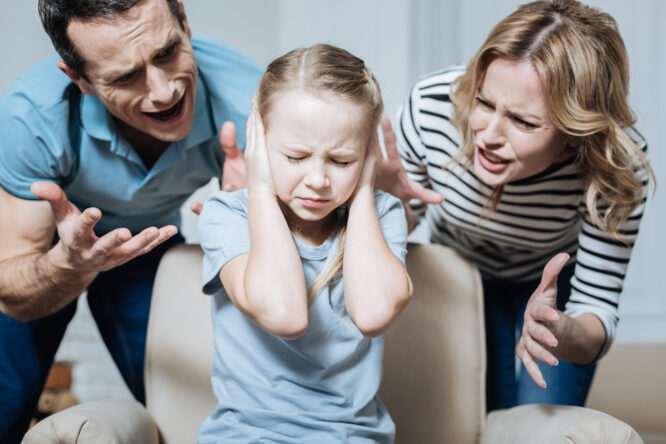Your family should be your haven, a source of unconditional love and support.

Sadly, sometimes our closest relatives can be the ones who end up having the most profoundly negative effect on our mental health. They don’t even have to be guilty of outright abuse — sometimes, it’s the subtle digs, the unspoken expectations, or the constant comparisons that leave us feeling drained and down. If you’re feeling a little blue around your fam, it might be time to look beyond the obvious and consider these lesser-known signs that your family might be contributing to your depression.
1. None of your achievements are ever good enough.

Maybe you landed a new job, got a promotion, or even just finished a DIY project you’re proud of. But instead of congratulations, you get a lukewarm response or a backhanded compliment. Over time, this constant minimisation of your accomplishments can make you doubt your abilities and feel like you’re never good enough.
2. Your feelings don’t matter to them.

When you try to share your emotions, whether it’s excitement, sadness, or frustration, they brush it off as “overreacting” or “being too sensitive”. This invalidation of your feelings can leave you feeling isolated and misunderstood, making it difficult to process and cope with your emotions in a healthy way.
3. They use “humour” as a weapon.

While a bit of playful teasing can be fun, if your family constantly uses sarcasm or jokes to put you down, it can be incredibly hurtful. Over time, these seemingly harmless jabs can chip away at your self-esteem and leave you feeling insecure and unworthy.
4. There’s a constant undercurrent of tension.

Even when everyone seems to be getting along, there’s an underlying tension that you can feel in the air. Maybe there are unresolved conflicts, passive-aggressive comments, or a general sense of unease. This constant tension can be exhausting and create a stressful environment that takes a toll on your mental health.
5. They’re overly critical of your choices.

Whether it’s your career path, your partner, or even your taste in clothes, your family always seems to have an opinion. Their constant criticism can make you doubt yourself and your decisions, leading to feelings of anxiety and inadequacy.
6. They make you feel like you’re walking on eggshells.

You’re constantly worried about saying or doing the wrong thing, afraid of triggering a conflict or upsetting someone. This constant state of hypervigilance can be emotionally draining and make it difficult to relax and be yourself around your family.
7. They set unrealistic expectations for you.

Maybe they want you to follow a certain career path, achieve specific milestones by a certain age, or even live up to their own unfulfilled dreams. These unrealistic expectations can create a sense of pressure and make you feel like you’re constantly falling short, leading to feelings of disappointment and inadequacy.
8. They always tell you how much you DON’T stack up to other people.

They constantly compare you to your siblings, cousins, or even strangers, pointing out how much better they’re doing in life. These comparisons can make you feel like you’re not good enough and create a sense of competition within the family, leading to feelings of resentment and inadequacy.
9. They invade your privacy.

They go through your things without permission, read your messages, or ask intrusive questions about your personal life. This lack of respect for your boundaries can make you feel violated and distrustful, leading to feelings of anxiety and paranoia.
10. They don’t respect your boundaries.

Maybe they show up unannounced, overstay their welcome, or try to control your decisions. This disregard for your personal space and autonomy can leave you feeling suffocated and powerless, making it difficult to assert your own needs and desires.
11. They guilt-trip you.

They use guilt as a weapon to manipulate your behaviour or get you to do what they want. Whether it’s guilt-tripping you into spending more time with them or making decisions based on their expectations, this emotional manipulation can leave you feeling trapped and resentful.
12. They’re emotionally unavailable.

When you need emotional support or a shoulder to cry on, they’re nowhere to be found. They might be physically present, but they’re not emotionally invested in your well-being. This lack of emotional connection can leave you feeling isolated and unsupported, making it difficult to cope with life’s challenges.
13. They dismiss your mental health struggles.

When you try to talk about your depression or anxiety, they dismiss it as “just a phase” or tell you to “snap out of it”. This invalidation of your mental health struggles can make you feel like you’re overreacting or making it up, leading to feelings of shame and self-doubt.
14. They blame you for their problems.

They make you feel responsible for their happiness or unhappiness, blaming you for their own shortcomings or failures. This unfair blame can create a sense of guilt and burden, making it difficult to establish healthy boundaries and protect your own mental well-being.
15. They’re overly controlling.

They try to control every aspect of your life, from your career choices to your social circle. This controlling behaviour can stifle your independence and leave you feeling trapped and suffocated, leading to feelings of resentment and rebellion.
16. You feel drained after spending time with them.

Instead of feeling refreshed and recharged, you feel emotionally exhausted and depleted after interacting with your family. This constant drain on your energy can be a sign that your family is unknowingly contributing to your depression, even if they have good intentions.




